Table of Contents
Essential Guide to Eco Laundry: Best Practices for Non-Toxic Laundry Routine
This page may contain affiliate links. We may earn a commission on purchases, at no additional cost to you. Learn more →
Is your laundry pile taking over your home? As a parent, I know the struggle - between diaper blowouts and playground adventures, kids can go through multiple outfit changes daily.
While washing mountains of clothes is inevitable, getting clean laundry doesn't have to involve harsh chemicals and come at the environment's cost: creating a non-toxic laundry routine is possible and easier than you might think.
Let me share how I transformed my family's laundry routine into an eco-friendly practice that still does an amazing job at keeping our clothes fresh while protecting both our health and environment.
So how do we master the art of eco laundry while managing those ever-growing laundry piles? Let's dive into solutions that make a real difference!
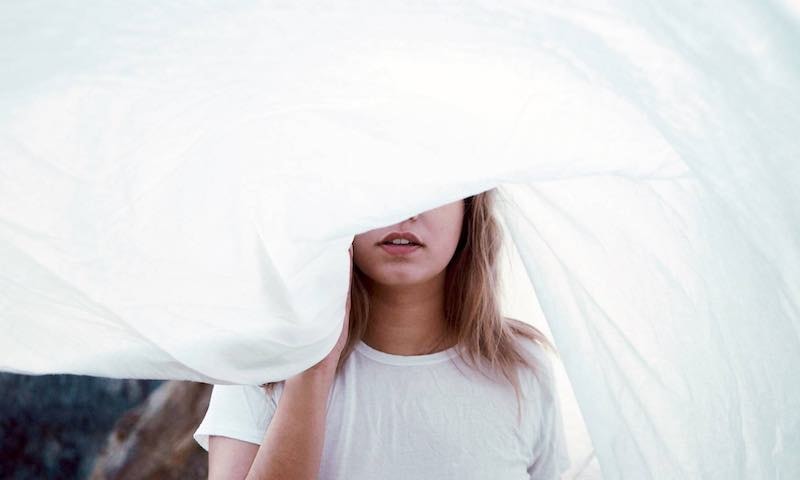
Photo by Yoann Boyer @ Unsplash
Why Eco Laundry Matters
Have you ever paused to consider the true impact of that familiar hum of your washing machine? As someone deeply invested in creating a healthier home environment, I've discovered some eye-opening facts about our laundry habits that changed my perspective forever.
The Numbers That Should Make Us Think
Let's break down the surprising environmental footprint of our laundry routines:
-
The average household runs around 300 loads of laundry annually. This figure is consistent across multiple sources, including Energy Star and the National Park Service
-
Each load consumes up to 41 gallons of water, which means a household could use over 12,000 gallons of water per year just for laundry. This is a significant amount, especially in areas facing water scarcity.
-
A typical 5kg laundry load washed and dried every two days can release around 440 kg of CO2 annually. This estimate aligns with data suggesting that each load washed in hot water and dried in a tumble dryer emits approximately 3.3 kg of CO2. Over the course of a year, this adds up quickly.
-
90% of the energy used in washing clothes goes to heating water. This is a well-documented statistic, emphasizing the importance of washing with cold water to save energy.
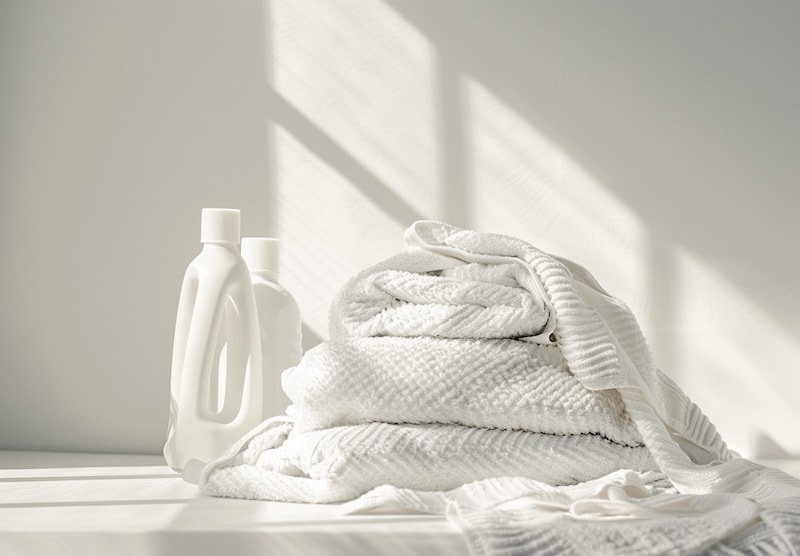
Beyond Water and Energy
But the environmental impact doesn't stop at water and energy consumption. Have you ever paused to consider what's actually in your laundry detergent or detergent sheets? As someone deeply invested in creating a healthier home environment, I've discovered some eye-opening facts about traditional laundry habits that changed my perspective.
Chemical Pollution:
-
Conventional detergents release phosphates and synthetic surfactants into our waterways
-
These chemicals contribute to water pollution and can harm aquatic ecosystems
-
Many traditional fabric softeners contain non-biodegradable compounds that persist in the environment
-
Optical brighteners that can irritate sensitive skin
-
Synthetic fragrances linked to hormone disruption
Microplastic Contamination:
-
Every load of synthetic fabrics releases thousands of microplastic particles
-
These particles are now found in 83% of the world's drinking water
-
Marine life is increasingly affected, with microplastics found in 100% of marine turtle species
The good news? Switching to a non-toxic laundry routine isn't just better for your family's health - it's also more environmentally conscious.
The Good News: Small Changes, Big Impact
Here's where you come in. Simple changes to our laundry routine can dramatically reduce these numbers:
-
Switching to cold water washing can reduce energy consumption by up to 90%
-
Using eco-friendly detergents eliminates harmful chemical runoff
-
Air-drying clothes can reduce your household's carbon footprint by 2,400 pounds a year
While these statistics might seem overwhelming, they actually represent an opportunity. Every load of laundry is a chance to make a positive choice for our planet. By making mindful adjustments to our laundry routines, we can significantly reduce our environmental impact while still enjoying clean, fresh clothes.
Think of it this way: if every household made just one or two eco-friendly changes to their laundry routine, the collective impact would be extraordinary. It's not about perfect solutions – it's about conscious choices that add up to meaningful change.
Ready to transform your laundry routine into an eco-friendly practice? Let's explore some practical solutions that make a real difference
6 Essential Steps to Create Your Non-Toxic Laundry Routine
Staying sustainable
Like practically everything you do in your household, washing clothes also has an impact on the environment. Think about the water used, the energy it costs to run the machines and the release of detergent and (plastic) fibers into the water. There are many simple ways to reduce your impact and to pursue a more eco-friendly lifestyle.
1. Ditch the Dryer
Ever wondered why your clothes pill and your freshly bought tees are worn out in just a few weeks? Well, the heat of the tumble dryer makes the fabric less elastic and takes up more energy than your fridge, dishwasher and refrigerator together.
I know it is tempting to go for this quick and dirty solution, but hanging your clothes out to dry in the open air is totally free and is as eco-friendly as can be. Those tiny rompers and onesies look adorable on a clothesline too!
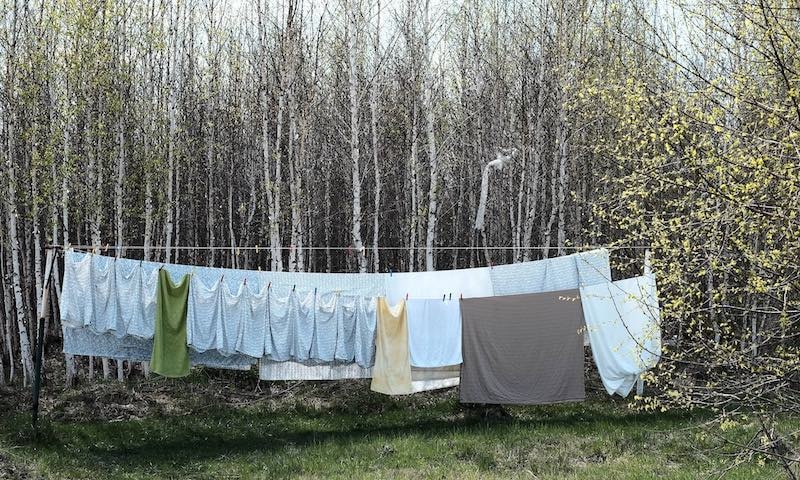
Photo by Dmitry Arslanov @ Unsplash
2. Switch to Natural Detergents and eco-friendly products
Making the switch to natural detergents is the cornerstone of any non-toxic laundry routine. Natural detergents do an amazing job at cleaning while being gentler on both your family's health and the environment. Just grab a different product when you are at the supermarket. Et Voila!
Wondering what makes the difference? Conventional detergents are filled with harsh chemicals and petroleum-based ingredients that pollute waterways. Eco laundry detergents use plant-derived surfactant, natural compounds that lift dirt and stains just as effectively as their chemical counterparts, which means leftovers in the wastewater are biodegradable, and can get a deep clean without huge negative environmental impact.
Are you a low budget washer and afraid that natural detergents might cost you more? There's also an option to make detergents yourself! Internet is full of recipes for homemade detergents and soaps, which are actually quite easy to make. It could even be a fun project to work on together with your kids.
3. Avoid Microplastics
Have you ever thought about what happens to your clothes while they're spinning in the washing machine? Here's a startling truth I discovered during my journey into sustainable living: every time we wash synthetic fabrics, we're inadvertently releasing thousands of microscopic plastic particles into our water systems.
The Microplastic Challenge in Our Daily Lives
Let's talk about those everyday items in your family's wardrobe:
-
Your daughter's beloved polyester ballet tutu
-
That cozy fleece jacket you wear on camping trips
-
Your son's favorite sports jerseys
-
Those stretchy leggings perfect for yoga
Each wash of these synthetic items releases hundreds of thousands of plastic microfibers – particles so tiny they slip right through water treatment plants. These microplastics are now found everywhere: in our drinking water, in the fish we eat, and even in the air we breathe. Recent studies have found microplastics in human blood and breast milk, making this an urgent concern for family health.
The good news? There are practical solutions we can use to dramatically reduce our family's microplastic footprint:
-
Invest in Microfiber Catching Solutions
-
Use specialized washing bags* or Washing Machine Filter*
-
These tools can capture up to 90% of microfibers during washing
-
One bag = hundreds of thousands of plastic particles prevented from entering our waterways
Simply wash the clothes in this bag and you prevent the microplastics from entering the water. One bag, big impact.
-
-
Choose natural fibers when possible
-
Wash synthetic items less frequently
-
Use front-loading machines, which cause less fiber shedding
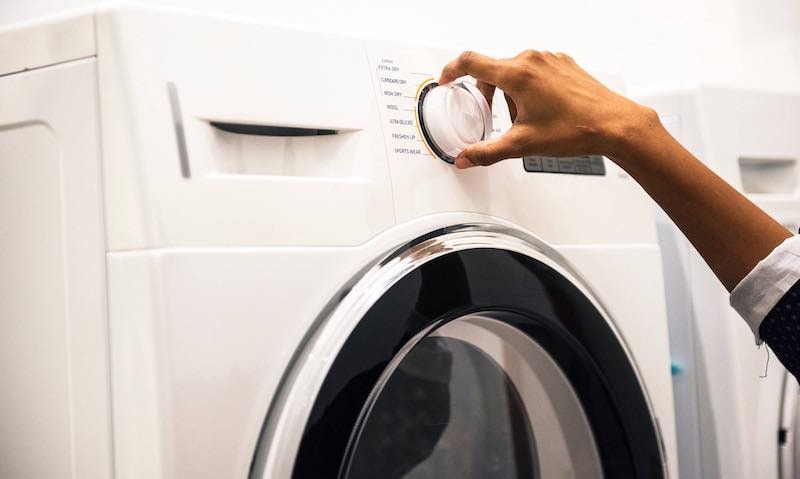
Photo by rawpixel @ Unsplash
4. Wash Cool and Quick
Here's a surprising fact that transformed my approach to laundry: approximately 75-90% of your washing machine's energy consumption goes toward heating water. Making the switch to cold water washing also isn't just about energy savings but preserving your clothes while protecting our planet.
Understanding Temperature Impact
-
Hot water (60°C/140°F): Only necessary for heavily soiled items or sanitizing
-
Warm water (40°C/104°F): Suitable for moderate dirt but uses significant energy
-
Cold water (30°C/86°F or below): Perfect for:
-
Regular daily loads
-
Colored garments (prevents fading)
-
Delicate fabrics
-
Workout wear and synthetics
-
Most stains (contrary to popular belief)
-
Mastering Cold Water Stain Treatment
For stubborn stains, follow this proven protocol:
-
Act quickly: Treat stains immediately when fresh
-
Pre-treat: Use natural stain removers like:
-
White vinegar for sweat and deodorant marks
-
Lemon juice for brightening whites
-
Baking soda paste for oil-based stains
-
-
Allow treatment to sit for 15-30 minutes
-
Wash in cold water with enzyme-based detergent
Energy and Cost Savings
Switching to cold water washing can:
-
Reduce your washing machine's energy usage by up to 90%
-
Save approximately $40-50 annually on your energy bills
-
Decrease your household's carbon footprint by 1,600 pounds per year
Remember: Only about 10% of your washing machine's electricity goes toward powering the motor – the vast majority is used for heating water. By making cold washing your default, you're making a significant impact with virtually no downside.
5. Optimize Your Wash Loads: The Art of Mindful Laundering
Smart loading is where mindfulness meets efficiency in your eco laundry journey. Think of your washing machine as an ecosystem – when balanced correctly, it helps your clothes last longer while minimizing environmental impact. Through years of experimenting with sustainable laundry practices, I've discovered that proper loading techniques can dramatically affect both cleaning effectiveness and garment longevity.
First, resist the temptation to stuff your machine to maximum capacity. While running full loads is more eco-friendly than multiple small ones, overpacking prevents proper water circulation and detergent distribution. Instead, aim for about 3/4 full, allowing clothes to move freely during the wash cycle.
Sorting goes beyond the traditional lights and darks – consider fabric weight your new best friend. Heavy items like towels and sweaters can overwhelm delicate clothing, leading to unnecessary wear and tear. Create three main categories:
-
Lightweight: T-shirts, underwear, and thin cotton items
-
Medium: Jeans, sweatshirts, and sturdy cotton pieces
-
Heavy: Towels, blankets, and thick materials
For delicate items, mesh bags are your secret weapon. These simple tools prevent snags, reduce fiber shedding, and protect both your clothes and our waterways from microfiber pollution. I especially recommend them for:
-
Lingerie and undergarments
-
Athletic wear with elastic
-
Clothes with embellishments
-
Baby clothes with small buttons or snaps
When it comes to cycle selection, longer isn't always better. For lightly soiled clothes, quick wash cycles (usually 30-45 minutes) can be just as effective while saving water and energy. Reserve longer cycles for heavily soiled items or bedding that needs deep cleaning.
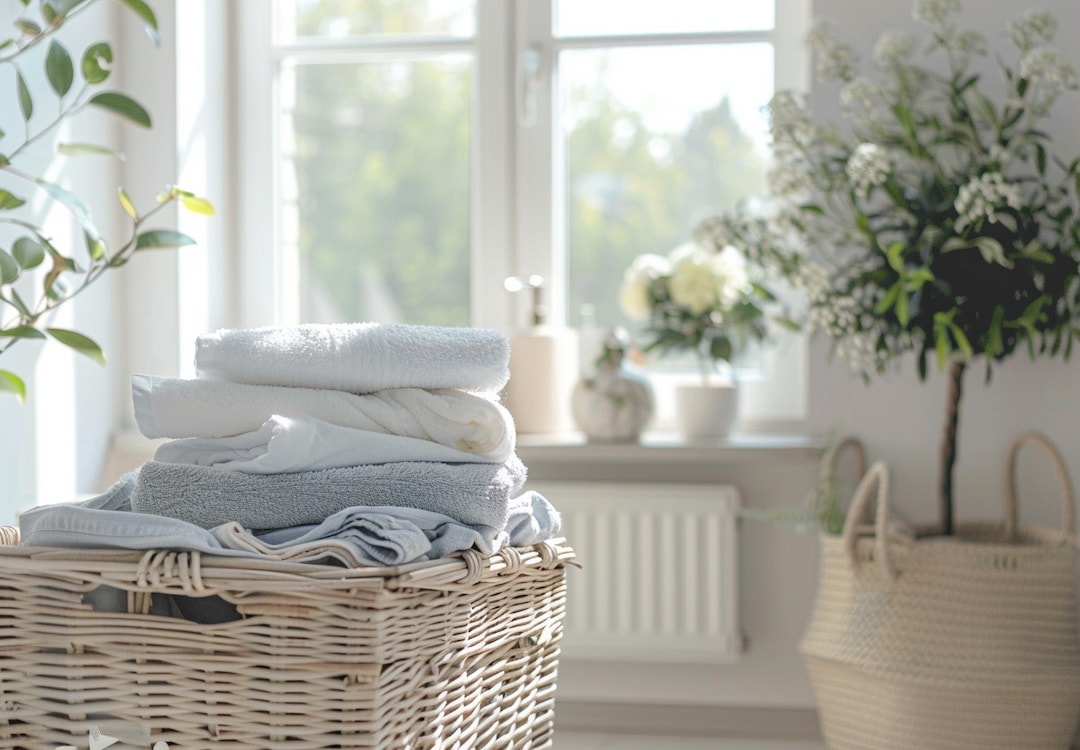
6. Create Natural Fabric Care Solutions: Your DIY Guide to Non-Toxic Laundry
The journey toward eco laundry becomes truly empowering when you start creating your own natural fabric care solutions. Not only do these alternatives eliminate harmful chemicals from your home, but they're also surprisingly effective and budget-friendly. Let me share some tried-and-tested recipes I've perfected through years of experimentation.
DIY Solutions: Customizing Your Non-Toxic Laundry Routine
Natural Fabric Softener Magic
Forget commercial fabric softeners loaded with artificial fragrances. White vinegar is your new eco laundry ally. Add 1/2 cup to your rinse cycle for naturally soft, fresh-smelling clothes. The vinegar smell disappears completely once clothes dry, leaving them naturally fresh. For extra softness, try this enhanced recipe:
-
2 cups white vinegar
-
20 drops of lavender or tea tree essential oil
-
1 cup distilled water Mix in a glass jar and use 1/2 cup per load.
Static Control the Natural Way
Static cling doesn't stand a chance against wool dryer balls. These sustainable alternatives to dryer sheets can last for years and actually help reduce drying time. To enhance their effectiveness:
-
Use 4-6 balls per load
-
Add 2-3 drops of essential oil to each ball
-
Replace oils every 3-4 loads
-
Store balls in a breathable bag between uses
Powerful Natural Stain Solutions
Create your own stain-fighting arsenal with these targeted solutions:
For Protein-Based Stains (food, sweat, blood):
-
Mix 1/2 cup baking soda with enough water to form a paste
-
Add 1 tablespoon hydrogen peroxide
-
Gently work into the stain
-
Let sit for 15-20 minutes before washing
For Grease and Oil:
-
Sprinkle corn starch or arrowroot powder on fresh stains
-
Let sit for 30 minutes to absorb oil
-
Brush off excess and treat with paste made from:
-
1/4 cup castile soap
-
2 tablespoons baking soda
-
5 drops lemon essential oil
-
Natural Brightening Solutions
Skip the chlorine bleach and try these gentle yet effective brighteners:
-
Citrus Brightener:
-
1/2 cup lemon juice
-
1 cup hydrogen peroxide
-
2 cups water Mix in a spray bottle and pre-treat whites before washing
-
-
Sunshine Boost:
-
Hang white items in direct sunlight
-
Spray with diluted lemon juice
-
Let nature's UV rays do the work
-
Remember to store all your natural solutions in glass containers and label them clearly with ingredients and dates. These homemade alternatives not only protect your family from harsh chemicals but also reduce plastic packaging waste – a win-win for both personal and planetary health.
Beyond the Basics: Creating a Holistic Eco Laundry System
Remember, eco laundry is part of a bigger picture – it's about creating a healthier home environment while reducing our environmental impact. Consider these additional steps:
-
Install a water filter on your washing machine to remove chlorine and heavy metals
-
Choose brands that prioritize sustainable packaging
-
Repair clothes instead of replacing them
-
Educate family members about conscious non toxic laundry practices
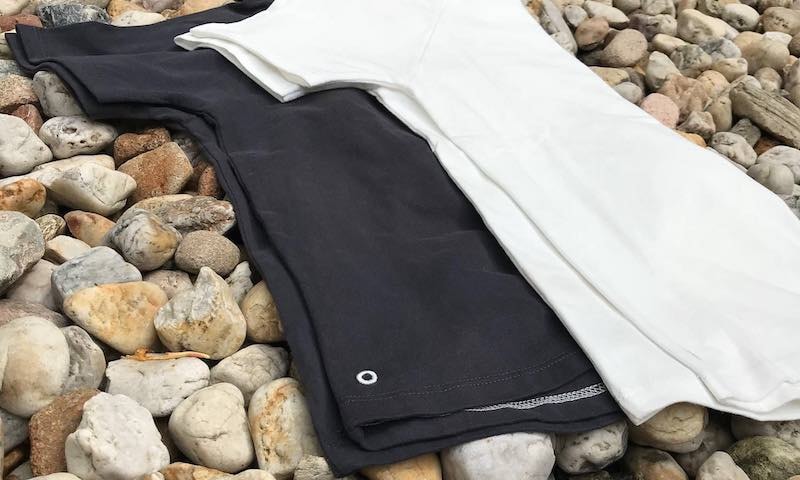
Making the Switch: Your Path to a Non-Toxic Laundry Routine
Start small and build gradually. Even implementing just one or two of these practices can make a significant difference. The key is consistency and understanding that every load of mindfully washed laundry contributes to a healthier future for our families and our planet.
-
Replace your detergent with a non-toxic alternative
-
Implement cold water washing
-
Add microplastic catching solutions
-
Introduce natural fabric care products
-
Create your own DIY solutions
Remember, every load of laundry is an opportunity to make healthier choices for your family and our planet. Your non-toxic laundry routine doesn't have to be perfect from day one – small, consistent changes add up to significant impact over time.
Interested in further other simple actions to be more sustainable? Keep on reading!
2 comments
As someone from the PlanetCare team, I just wanted to add that the most effective way to stop microfibers is a closed-loop microfiber filter. Our PlanetCare filter captures up to 98% of microfibers and—most importantly—we collect the used cartridges and make sure all captured fibers are safely removed from the environment, not released back into nature.
It’s the only solution designed to stop microplastics at the source and keep them out of our rivers, oceans, soil, and food chain.
Very helpful and a real eye opener. Many thanks. T













